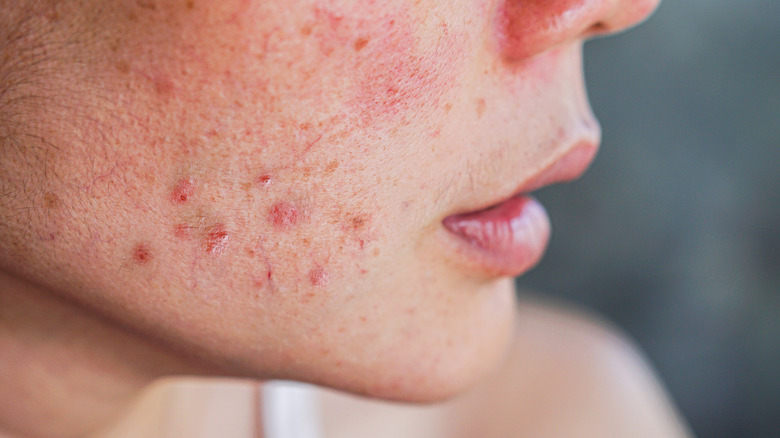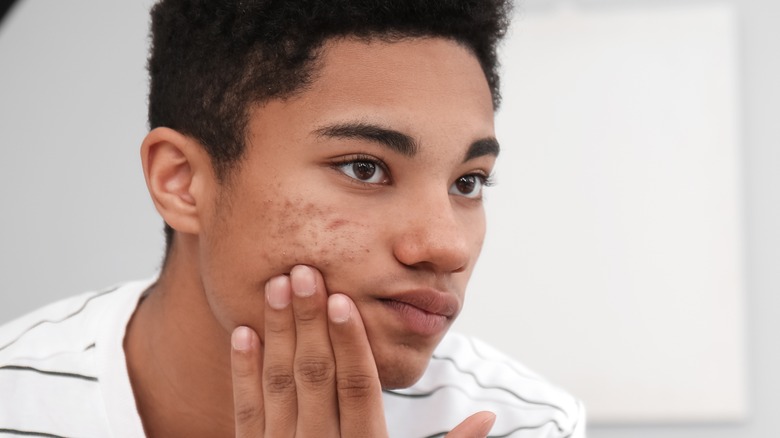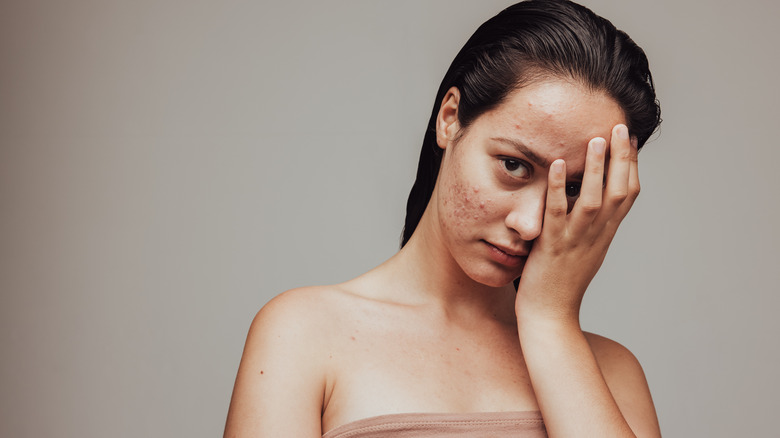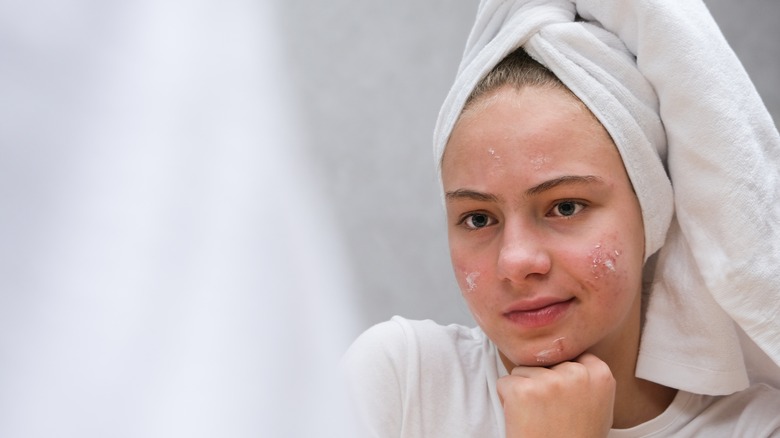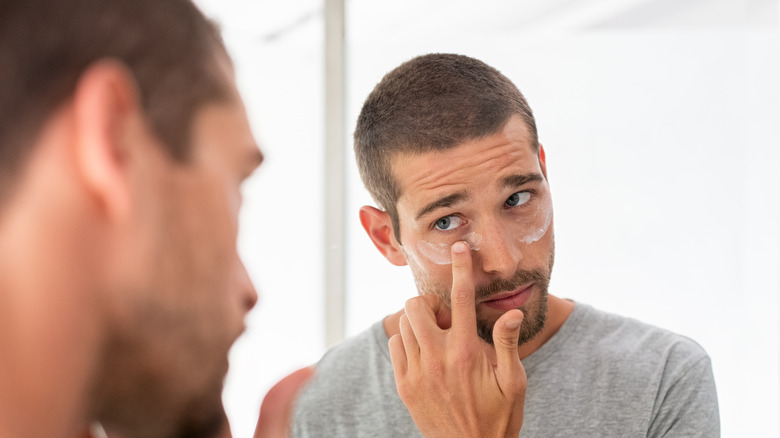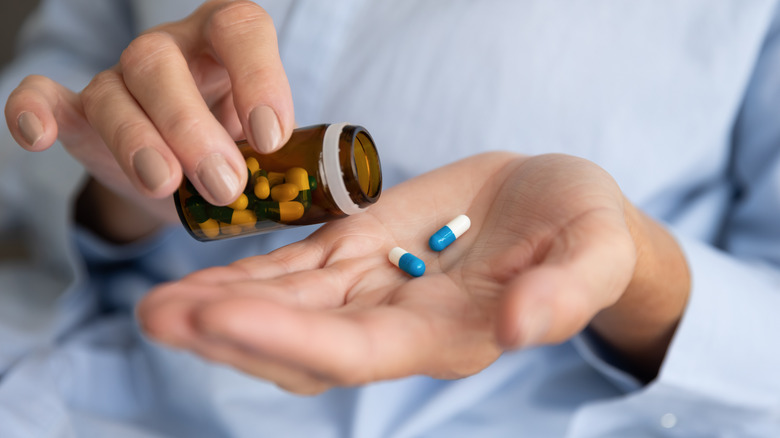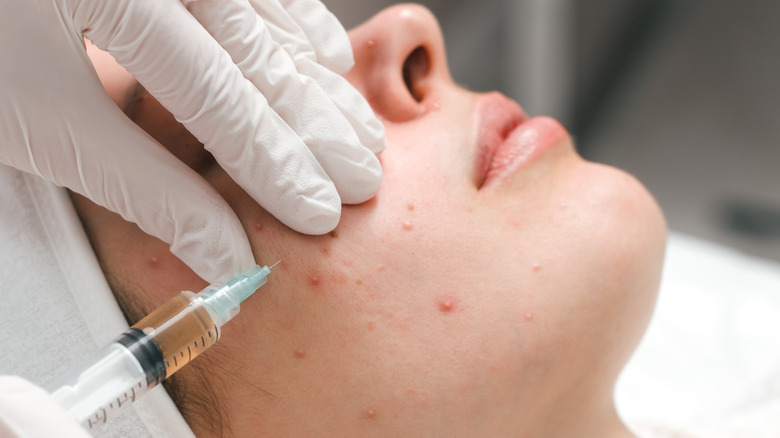The Ultimate Guide For Getting Rid Of Inflammatory Acne
Inflammatory acne is not your average whitehead or blackhead. Unlike these blemishes that you usually know by name, inflammatory acne is painful and creates pimples deep within your skin. This often results in a series of swollen, sore flare-ups, according to the Cleveland Clinic. For those with inflammatory acne-prone skin, these breakouts can affect both your appearance and confidence.
While the exact cause of your acne may vary, there are some key practices for preventing and treating inflammatory acne. According to the Cleveland Clinic, inflammatory acne happens when the pores of your skin or follicles of your hair get clogged with oils and dead skin cells. There are different kinds of inflammatory acne and some that you may already be familiar with, like cystic acne. Preventing and treating inflammatory acne is possible, and although it takes patience and discipline (please don't pop that pimple), you can adapt your lifestyle to make way for clear, inflammatory acne-free skin.
Inflammatory acne vs. your everyday pimple
Acne is common, but not everyone is prone to the painful spouts of inflammatory acne caused by blocked pores and hair follicles deep within the skin. While inflammatory acne is common on the face, it can also occur on the chest, back, and shoulders, according to the Cleveland Clinic. Inflammatory acne tends to be red and swells, making breakouts uncomfortable. It occurs when pores and hair follicles are clogged by something, such as oil, dirt, or bacteria. The pore becomes inflamed and filled with pus.
Some types of inflammatory acne include papules, pustules, cysts, and nodules, according to Mind Body Green. "Papules look like solid red bumps, while pustules have pus at the top," Zenovia Gabriel, M.D., a board-certified dermatologist, told Mind Body Green. Often, papules become pustules. Cysts never have a pus-filled head at their surface; instead, these inflamed bumps tend to be "large, soft, fluid-filled," according to the Cleveland Clinic. Nodules, like cysts, don't have heads at their tip, but they are made of harder bumps beneath the skin. Dermatologist Rachel Maiman, M.D., told Mind Body Green that nodules "often feel like firm knots under the skin and can be found on the face and body." Nodules can be especially painful when touched.
But none of these are pimples to be popped. Picking at your skin can make inflammatory acne worse, cause scarring, and create painful infections.
How to prevent inflammatory acne
While acne may sometimes feel inevitable, that doesn't have to be the case. There are plenty of common practices you can implement into your lifestyle to minimize the number of inflammatory acne flare-ups you have. Additionally, there are acne mistakes you should avoid.
The first rule of thumb, according to the Cleveland Clinic, is to stop touching your face. Each time you touch your face, you are unknowingly exposing your pores to extra oil and dirt. This includes popping pimples already there. Whiteheads and blackheads can become irritated and lead to inflammatory acne if you constantly pick at them. Be sure to wash your hands well any time you must touch your face.
For make-up and skin care, choose products that are water-based and oil-free. Using non-comedogenic cleansers, moisturizers and makeup can lower your chances of getting clogged pores, the Cleveland Clinic says. Wash your face gently before and after bed and after any time you sweat, like a workout. A healthy diet can also help with acne flare-ups. Eating lots of dairy and sugars can make your acne worse, according to the Cleveland Clinic. And if you're a smoker, you should quit. All kinds of acne are more common in those who smoke, the Cleveland Clinic says.
How to treat inflammatory acne
For some, over-the-counter acne treatments and home remedies work just fine for getting rid of inflammatory acne. For others, their inflammatory acne requires medical treatment or procedures from a dermatologist. Some home remedies can help minimize the pain or appearance of inflammatory acne. Spot treatments like face masks, serums, or hydrocolloid patches can minimize the appearance of pimples, according to Mind Body Green. Mind Body Green also recommends putting ice covered by a tissue or paper towel on flare-ups to help reduce swelling.
However, these remedies don't attack inflammatory acne at their root causes. There are three main types of inflammatory acne treatment, the Cleveland Clinic explains. Topical treatments go on top of your skin, often in the form of a cream or ointment. Removal treatments, also called extraction procedures, should always be done by a professional, because they go beneath the skin to remove acne or kill the bacteria that is causing it. The third option is oral treatments. A doctor can prescribe oral medications ranging from hormonal birth control to antibiotics to treat inflammatory acne. And even if you already are experiencing inflammatory flare-ups, some of these preventative measures, like changing up the contents of your diet, can help reduce the appearance of cystic acne.
The best topical anti-inflammatory acne products
Topical anti-inflammatory acne products are applied to the skin and not meant to be ingested. Your best bet is to use topical products that have antimicrobial ingredients like benzoyl peroxide, according to Ife Rodney, M.D., a board certified dermatologist. "[Benzoyl peroxide] kills the acne-causing bacteria [C. acnes] that lives within our hair follicles, and it also helps to break up and remove dead skin cells that clog our pores," Dr. Rodney told Mind Body Green. If you're interested in alternative medicine, tree oil can be just as effective as benzoyl peroxide, according to the Mayo Clinic.
You'll also want to use products that, in addition to anti-inflammatory properties, possess soothing ingredients. Both Mind Body Green and the Cleveland Clinic recommend topical products that include salicylic acid. Aloe vera is a great source of salicylic acid and will both soothe the inflammation while unclogging your pores. The Cleveland Clinic also recommends products that include azelaic acid, niacinamide, retinoids like tretinoin and adapalene, and topical antibiotics like clindamycin, erythromycin, and dapsone. Check the ingredients list of your favorite products to ensure that they are going to be effective for treating inflammatory acne.
Ask your doctor about oral prescriptions
For some, topical treatments simply aren't effective enough to battle both inflammatory acne and the self-esteem issues it can create. In that case, you should talk to your doctor about getting prescribed oral medications to treat your inflammatory acne.
For moderate to severe acne, your doctor may prescribe a short treatment of antibiotics. Antibiotics will limit the amount of bacteria able to get beneath your skin (literally), but it's important to finish your course. According to the Mayo Clinic, "Oral antibiotics should be used for the shortest time possible to prevent antibiotic resistance. And they should be combined with other drugs, such as benzoyl peroxide, to reduce the risk of developing antibiotic resistance."
Dapsone is cited by the Cleveland Clinic as an anti-infective drug that can be used to treat acne. Hormonal therapies like birth control can also be used to fight inflammatory acne, according to the Cleveland Clinic. Additionally, isotretinoin can be prescribed for the most serious cases of inflammatory acne. Isotretinoin treatment, commonly referred to as Accutane, last months, according to the American Academy of Dermatology.
Professional procedures for inflammatory acne
Professionals can help you remove blemishes caused by inflammatory acne through a variety of procedures. These procedures should be done by trained professionals (don't go picking at your pimples — remember, don't touch your face). You might be familiar with Sandra Lee, the social media sensation known as Dr. Pimple Popper. Dr. Lee is a dermatologic and cosmetic surgeon who performs these kinds of procedures. According to the Cleveland Clinic, acne surgery utilizes "needles and tiny scalpels to extract blackheads or milia (small cysts)." The Cleveland Clinic also cites cortisone injections and light therapy as potential procedures your dermatologist may recommend.
While dealing with inflammatory acne can be inconvenient and difficult, there are lots of treatments available to help clear up your skin. Ensuring that you are taking care of yourself by not touching your face, eating a balanced diet, and not smoking can reduce your risk of inflammatory acne breakouts. Talk to your doctor or a dermatologist about seeking treatment that is right for you.
